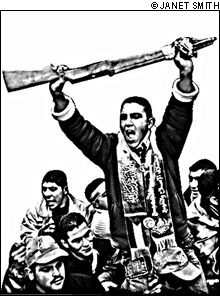 It was an eerie and unsettling reprise of George W. Bush’s embarrassing post–Hurricane Katrina interview with ABC’s Diane Sawyer when he infamously declared, “I don’t think anybody anticipated the breach of the levees.”
It was an eerie and unsettling reprise of George W. Bush’s embarrassing post–Hurricane Katrina interview with ABC’s Diane Sawyer when he infamously declared, “I don’t think anybody anticipated the breach of the levees.”
Last Friday, in the wake of another cataclysm — this one man-made — the world was treated to the president telling CBS anchor Bob Schieffer that Hamas’s victory in the Palestinian elections was a “lightning bolt” that “caught everyone by surprise.”
Actually, there were some precursors to the geopolitical earthquake in the Palestinian territories that saw Hamas win more than 70 of 132 seats in parliament — including a prescient June 9, 2005, New York Review of Books essay chronicling Hamas’s rising political fortunes and a prophetic page-one Boston Globe photo on the day before the balloting, showing a sea of green-capped Hamas supporters rallying in Hebron. In Palestinian as well as US politics, field organization and campaign “visibilities” can be a true predictor of ballot-box strength.
But the fact that Hamas’s big win managed to catch politicians, policymakers, and the media by surprise offers several lessons. One is the fallibility of those damn exit polls. Another is the short attention span and strained resources of a Mideast press corps that, over the past two and a half years, had shifted focus from the Palestinian intifada to the Iraqi insurgency.
But the biggest lesson of all — what is most worrisome and ominous about the expressed will of the Palestinian people — is that the vote casts doubt on the principles of US foreign policy and the Bush administration’s competence to carry it out.
The competence problem, which Bush exemplified with his “who knew?” admission to Schieffer, reared its ugly head again on Monday. A front-page story in the New York Times included the damning admission by Secretary of State Condoleezza Rice that the US — which traditionally acted as the primary broker between the Palestinians and Israelis but dramatically downgraded that role during this administration — was asleep at the switch on a matter central to its foreign-policy interests. “I’ve asked why nobody saw [the Hamas win] coming,” Rice told the paper. “It does say something about us not having a good enough pulse.”
An even broader concern is that the Palestinian election revealed a fundamental flaw in the nation’s neocon-driven post-9/11 foreign policy. The Bush White House has pushed the idea of exporting elections as a panacea for the world’s ills. So in getting just what it wanted — free and fair balloting in the Palestinian territories — the president has unwittingly illustrated the problem with foisting so-called democracy on places with no such traditions.
YOU ASKED FOR DEMOCRACY read the ironic headline in a Slatestory analyzing the Hamas win. Now everyone across the globe is wondering whether the prospects for Mideast conciliation just got knocked back a generation or two.